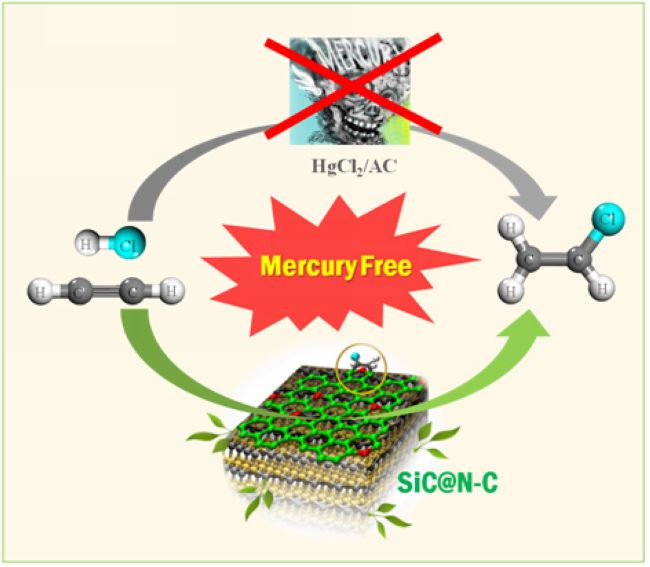The Dalian Institute of Chemical Physics (DICP) research team led by Prof. Bao Xinhe made great progress on nano-structured carbon materials for catalysis. The research results were published on Nature Communications (DOI 10.1038/ncomms4688).
Polyvinyl chloride (PVC) is one of the most widely used plastics. In 2013, China, a major producer and consumer of PVC, manufactured 15.3 million tons, with 75% produced from a coal-based acetylene hydrochlorination process employing a mercuric chloride catalyst. A large quantity of mercury was used in the process, however, which can lead to severe environmental contamination and directly impact human health. The United Nations sanctioned a global treaty, “The Minamata Convention on Mercury,” in January 2013, with the goal of controlling global mercury emissions. The treaty includes prohibition of mercury production and a ban on importing and exporting mercury-containing products until 2020. Such restrictions have put significant pressure on the coal-based PVC-production industries, particularly in developing countries such as India and China.
The exploration of alternative, non-mercury catalysts has thus become an increasingly important new research focus, and a wide range of candidate metals are being investigated. Profs. Pan and Bao from DICP recently demonstrated that a nano-composite derived from silicon carbide (SiC@N-C) activates acetylene for hydrochlorination directly. By controlling the synthesis process, a nano-structured carbon layer is created on the surface of the SiC and N atoms, which are doped in situ into the carbon structure via ammoniation. When tested under conditions with a space velocity similar to that in the mercury-based industrial process, a single pass conversion of acetylene reached 80%, with a vinyl chloride selectivity of over 98%. Furthermore, the catalyst exhibited a relatively stable performance over a 150 hour test. These results, which were recently published in Nature Communications (DOI 10.1038/ncomms4688), open the door to exciting new possibilities for the development of metal-free, non-mercuric catalysis processes for the synthesis of vinyl chloride from acetylene, as well as providing direction for the design of carbon-based catalysts for the activation of other alkynes. (Text by SHI Ying/ Photo by LI Xingyun)

Contact: Prof. BAO Xinhe
Email: xhbao@dicp.ac.cn